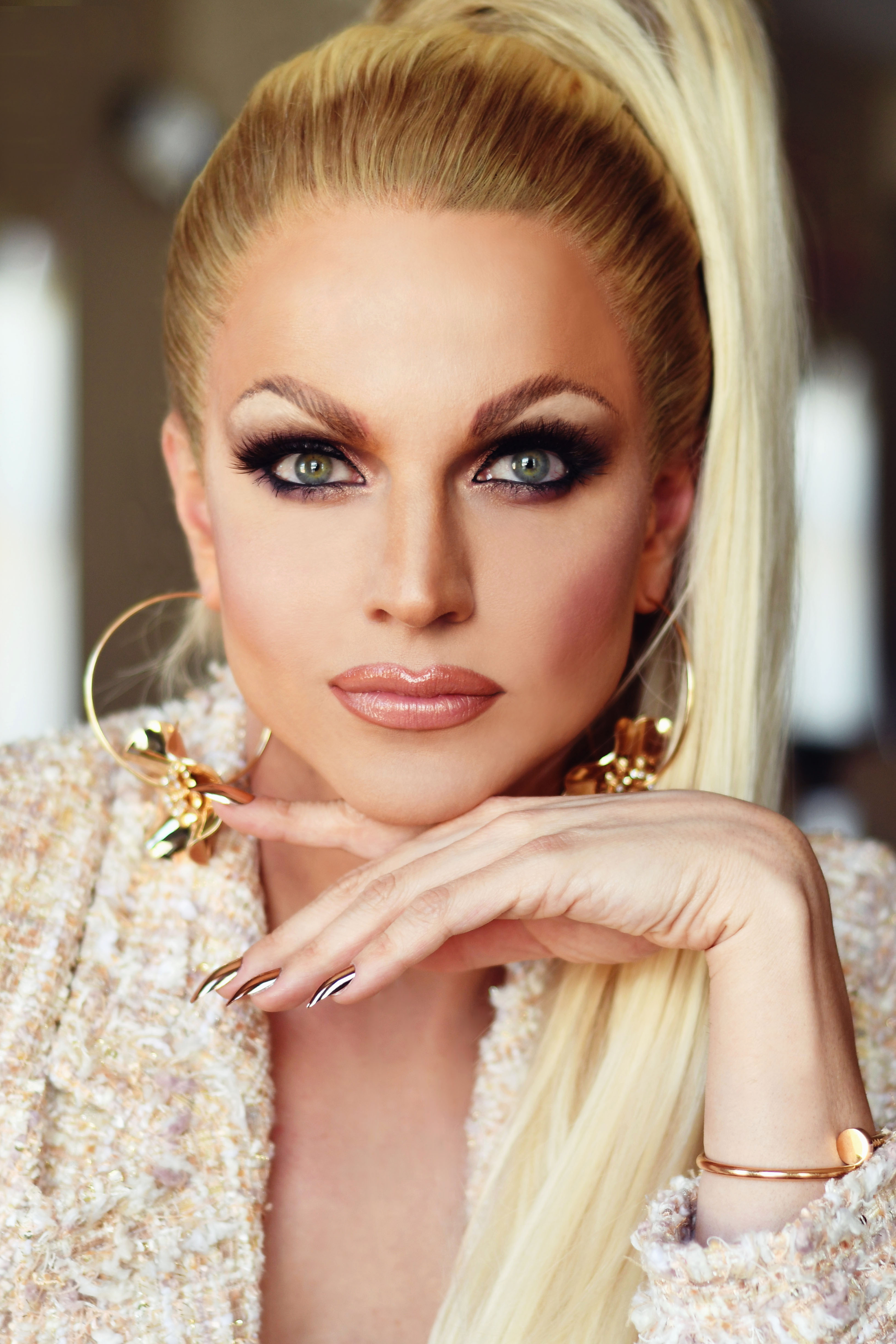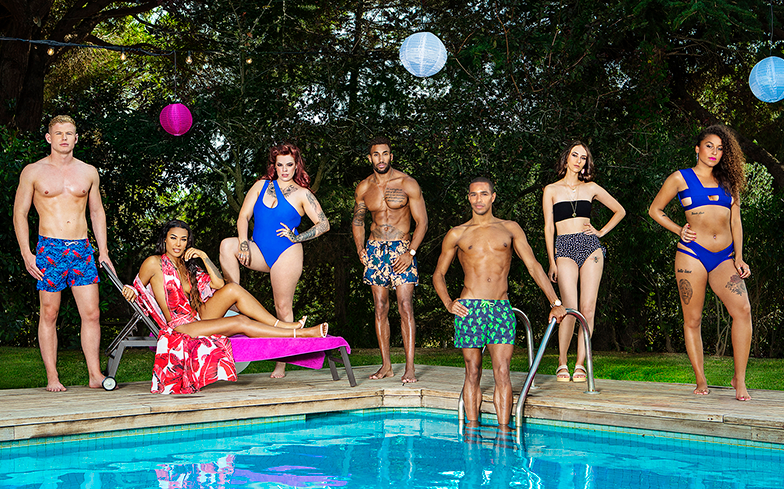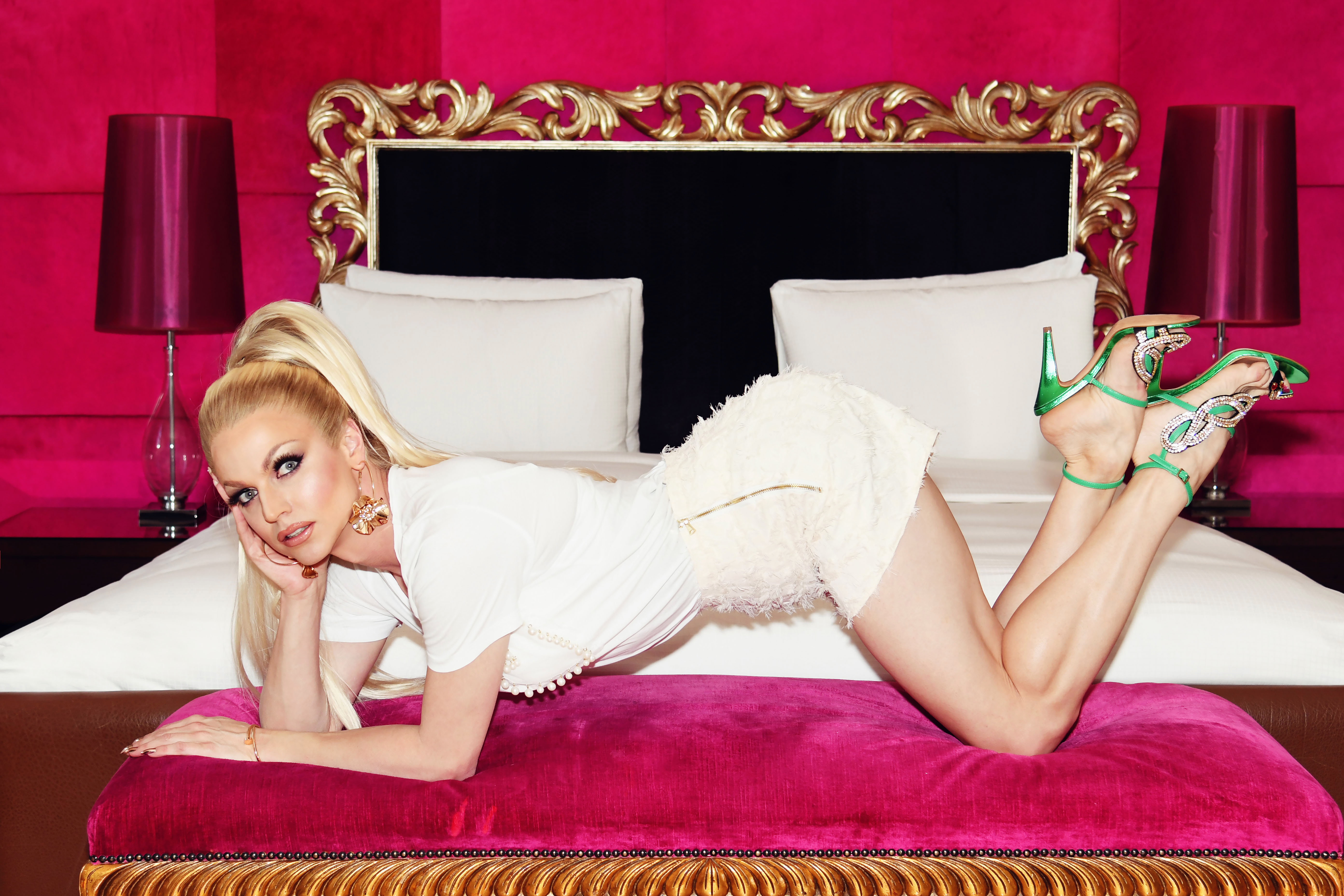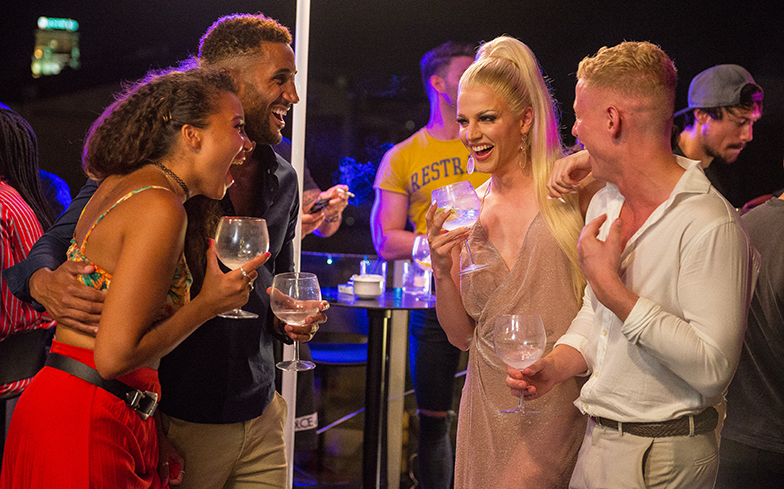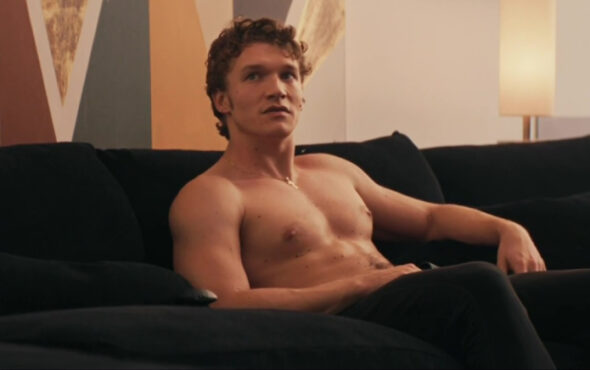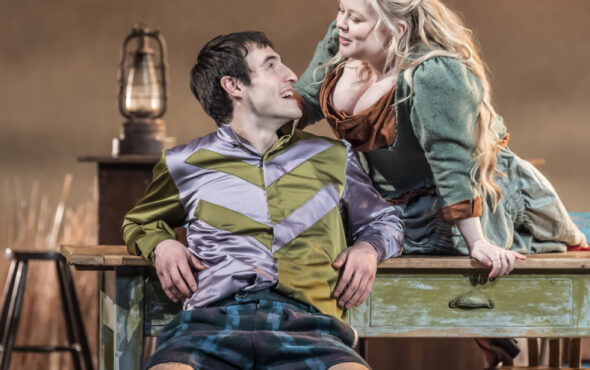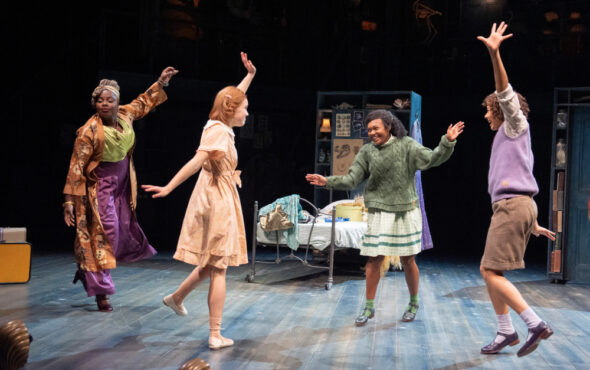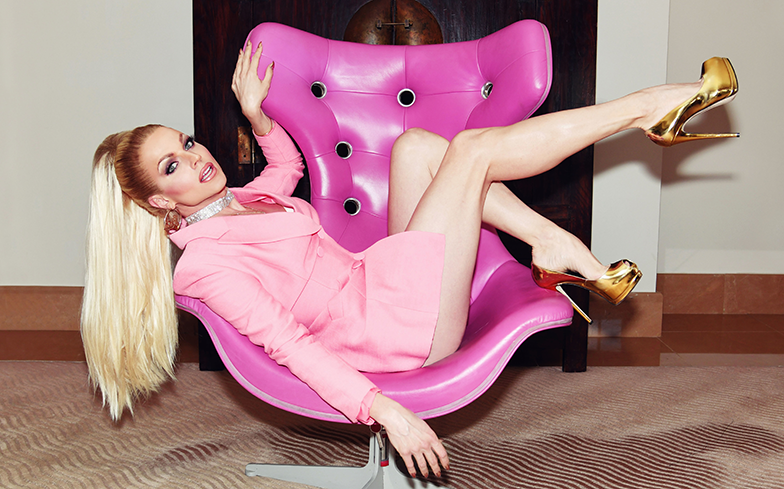
“The Bi Life is needed because the conversation about sexuality and queer things in general have skyrocketed in recent years,” Courtney Act, real name Shane Janek, tells us on the set of her aforementioned ten-part dating series, which focuses on a group of bisexual, pansexual and fluid British hunnies on the ultimate adventure to find the one and yanno, themselves.
Airing Thursdays on E! in the UK and Ireland, the groundbreaking series is hosted by the Drag Race legend and Celebrity Big Brother champion, and takes place against the stunning backdrop of Barcelona – the LGBTQ capital of Europe. Because our current TV climate is heterosexual as fuck (Love Island, Ex on the Beach, Take Me Out, etc), we flew out to Spain, downed some Sangria with Courtney, and discussed quiiite a bit about the series and why the bisexual community are in need for some goddamn representation.
Courtney says a massive reason why the show is so important right now is because of the various stigmas still faced by those in the bisexual community. She brings up 27-year-old fitness influencer Ryan Cleary, a cast member on The Bi Life, who she says “struggles” with having romantic relationships with women “because it’s not easy to find a woman who is accepting of him being bisexual. That limits how he’s able to connect with a woman, and therefore he’s more romantically attracted to men.” Strangely, statistics show that straight women are much more uncomfortable with dating a bisexual person than straight men, who fetishise the concept of having a threesome with their female partners. Remember when every single boy, man and brute on the planet creamed themselves over T.A.T.U’s All The Things She Said video? Why is it then, that straight women don’t find two men together attractive? Courtney explains: “I think it all stems from the patriarchy, and from misogyny. Homophobia is rooted in misogyny, women are seen as the lesser sex by the men and that gay men are seen as less than because they’re feminine. Just because you’re a woman, it doesn’t mean you’re free from the bonds of misogyny.”
She then touches upon the idea that straight men aren’t threatened by two women having sex because men dominate the narrative and see themselves as the third person. “Two women together, men are like, ‘Oh, what are they gonna do? Hug?’ There’s nothing penetrative, there’s nothing that’s taken away, they just see two women as the object of their affection.” In the Celebrity Big Brother house, Courtney raised the issue with Malika Haqq, and questioned whether she’d be comfortable dating a bisexual man. “She was kind of caught off guard. She was like, ‘Oh, I don’t think I’d be okay with that.’ And it’s that interesting thing, once examined, it is quite confronting for a woman. I think it’s because of all that conditioning that happens in society, and also there’s no middle ground, because it is a monosexual world where all a straight man has to do to prove he’s straight is show that he’s attracted to women. For a gay man to prove he’s gay, he just needs to show that he’s attracted to men. But in a bisexual world, it kind of ruins all of that. And so I think for women, there’s that fear that the person they’re dating is gay, because there is that misunderstanding in erasure of the bisexual identity.”
But why is the bisexual identity often erased from narratives? Courtney raises the biggest misconception of them all, that bisexuality is merely a “stepping stone” towards homosexuality. “I think a lot of gay men in particular used bisexuality as a transitionary sexuality. I know I did when I came out. I was 18, and it was easier to say that I was bisexual than it was to say I was gay.” According to Courtney, “you were either gay or straight” in Sydney’s queer scene. “There wasn’t bisexual. I couldn’t rattle off a list of people that I know that are bisexual, except for a few ex-boyfriends. We grew up in these little echo chambers of homosexuality or heterosexuality or monosexuality. When I came out, if you were attracted to men, being gay was the only option.” Growing up, Courtney admits she felt “short changed” by celebrities who identified as bisexual, specifically mentioning stars such as David Bowie and Alan Cumming. “I felt like they were fence sitting, like, “We need you more! Stop standing in the middle!” As I’ve gotten older, I realised they were actually just bisexual. Then I found that my own attractions, which weren’t allowed in a monosexual world, have now been validated.” She continues: “Even doing this show, hanging out with all the guys, I’m like, ‘Oh! I identify as pansexual.’ It’s not that I’m wandering around, trying to have sex with women or living a heterosexual lifestyle, I’m still as gay and as camp as anybody. But I have experiences with people of different genders, and so I think that visibility and that conversation is important. The more that the conversation evolves, and people become comfortable, the more everyone gets laid.”
After a brief discussion about the Kinsey scale, in which I described myself as a 5.9 (roughly) out of 6, Courtney points out: “Isn’t it ridiculous and absurd for us to suggest that we would be with a woman, or attracted to a woman? Don’t you think you would be laughed out of the room if you said that? I’m a gay man, I’m pansexual, I’m a drag queen, I’m male, I’m genderqueer, I’m all of these things, there’s not one identity that I feel fixed to.” Courtney credits this stigma with gay men needing the binary to opposition ourselves from an “us” and “them”. “We needed to have that solid identity in ourselves, and in some ways, I think men who are attracted to women eroded a bit of that strength and unity. It seemed like we were giving away some power by allowing that part of the narrative, but I think that now gay men and gay women are so well established in our identity in society, that it’s okay to tease out the edges a little bit and say, ‘You know what? Some of us are attracted to different genders.’”
Oh, and Courtney wants you to know that being attracted to different genders does not make you “greedy”, the other classic bisexual stereotype, where if you’re attracted to men and women, then you’re absolutely, positively, 100% going to cheat on your partner because there’s just so much more out there to pick from, right? “‘Oh, are they always gonna be looking? Is the grass always greener?’” says Courtney. “You could say that about any human. It’s not just because of gender. If you’re in a relationship with someone, there’s still a whole percentage of the population that they’re gonna be attracted to, regardless, so it’s more about the fundamentals of the relationship and the understandings and agreements you have in that relationship.”
So how will The Bi Life avoid perpetuating these stereotypes? “The Bi Life will show many stories. I think that people will find some of those stereotypes, maybe some people are greedy, maybe some people are using bisexual as a transition, but not all of them are. Therefore, there’s all these different experiences and people will get to see same sex and different sex attractions and relationships and experiences.”
In the media, these stereotypes are often perpetuated and bisexuals are usually erased from narratives, or represented as “a villain, like Lady Gaga on American Horror Story. Any bisexual character is always a bit evil and manipulative.” Courtney explains further: “Bisexual people make up the largest percent of the LGBTQ community, but they’re the least represented, and so I think it’s really cool that there’s a group of people in this house who are just real people going on dates. There’s so much visibility for trans people, for gay men and lesbians, but there’s still not a lot for bisexual people.” Despite growing recognition of gender existing on a spectrum – which Courtney so fantastically explained in the Big Brother house earlier this year – she says sexuality is still being binarised, which is why “it’s cool The Bi Life is just showing young, fun, bisexual people dating and having real life experiences.”
In order to tackle bi-erasure, Courtney informs us: “With shows like The Bi Life. To create bi visibility. That’s the antidote to bi erasure.” However, she does add: “Shows like The Bi Life isn’t going to solve the problem. This isn’t an intellectual conversation in an echo chamber, it’s a reality television show on the E! channel, the home of the Kardashians. It’s about as mainstream as it gets. There’s shows on the BBC that have intellectual conversations that try to bring enlightenment to audiences, and then there’s me talking to John Barnes, Shane Lynch, Dapper Laughs and Andrew Brady in the bathroom of Celebrity Big Brother, which took the information and disseminated it in a much wider way. I realised, in my world, being on reality television and creating YouTube videos, is my way of being involved, and Big Brother is that. The Bi Life is that.” Courtney acknowledges that The Bi Life isn’t the high-brow intellectual conversation that activists and advocates prefer it to be, but is confident it will bring much-needed visibility for bisexual people. “People will still watch and say, ‘Oh he’s gay! She’s this, he’s that.’ I think, just having it on television and people watching will just sort of tick away and process. It’s a long journey, and it started long before The Bi Life, and it will continue long after. It’s just cool to get to be a part of it, and to bring it to such a mainstream place like E!”
Fashion Darkwah Kyei-Darkwah
Grooming Shamirah Sairally
Location The May Fair Hotel
Special thanks to Wigs by Vanity
Courtney wears River Island; earrings her own
